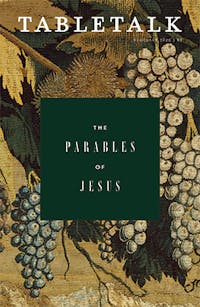
Request your free, three-month trial to Tabletalk magazine. You’ll receive the print issue monthly and gain immediate digital access to decades of archives. This trial is risk-free. No credit card required.
Try Tabletalk NowAlready receive Tabletalk magazine every month?
Verify your email address to gain unlimited access.
The context of these two famous parables, which lead up to the even more famous parable of the prodigal son, is that Jesus is being criticized for spending time with “sinners.” He is receiving and eating with them. Jesus is spending time with those whom the Pharisees and the scribes, those arch-legalists of Jesus’ day, deem to be beyond the pale, out of bounds, unwelcome and unacceptable to God. The problem is this: If Jesus is all that He claims to be (which, as far as the Pharisees can see, is at least a holy man who speaks for God), how on earth can He be spending time with these unbearable “sinners”?
As Jesus replies to their criticisms by means of these parables, He repositions the conversation in a masterful (and Masterly) way: far from being questionable, what Jesus is doing actually represents the very heartbeat of the joy of heaven.
Let’s first look at how He repositions the conversation in each of the parables and then apply that to our context of twenty-first-century ministry.
Let’s begin with the parable of the lost sheep. It’s familiar enough. A man who has a hundred sheep loses one. What does he do? Does he forget about the one he has lost and focus on the vast majority that are already in his care and safe? Or does he forget about the ninety-nine and go after the one? Or is there some mediating technique that he can adopt—delegating either the ministry to the one or the ministry to the ninety-nine so that he can multiply the impact? Given that the picture of God’s people as sheep was very familiar to all at the time, the original hearers would have immediately grasped that He was talking about people, not sheep. Jesus’ radical proposition appears inevitable because His question exposes how His hearers would have acted in relation to real sheep. They would leave the ninety-nine and go after the one.
For those who have spent their life in urban environments—the vast majority of the world these days—it is worth a brief refresher on how silly sheep are. They get lost easily. They fall over and don’t seem to be able to figure out how to stand up again. If anything is an apt description of what it is like to do pastoral ministry, it is shepherding. We are all like sheep who tend to stray. This first parable emphasizes that even when someone has strayed, even when he has “sinned” and is beyond the pale and out of bounds by the standards of the religious rules and rituals of the day, the responsibility of the shepherd is to focus on the one, not the ninety-nine. Even more, it is the joy of heaven that is the reward for those who do focus on the one.

The second parable, that of the lost coin, broadly speaking makes the same point. The context, though, is less familiar to us. Why would a woman have “ten silver coins”? Most commentators over the years have agreed that the woman is a young unmarried woman, and the ten silver coins represent her dowry, which she has carefully saved up and perhaps kept in her hair as a witness to her availability for marriage. So, to lose one silver coin is the equivalent of losing not just a lot of money but also the possibility of getting married anytime soon. The emphasis of this story, then, is not so much on the “leaving behind” (presumably, you can keep the remaining nine coins somewhere safe while you search) as it is on the effort and diligence required to find the lost coin. Once again, the concluding point is the joy that comes as a result—this time the joy in community with her friends, as well with the courts of heaven itself, represented by the angels of God.
What should we learn about ministry today from these parables? First, the great divide in contemporary ministry between those who focus on “seekers” and those who aim to teach Christians only is a unbiblical divide not reflective of a larger biblical dynamic and arc. Does not Paul urge Timothy, a pastor who teaches Christians, to do the work of an evangelist? Second, if we are lacking joy in our Christian lives or in our churches, the first remedy is to start seeking to find the lost.
